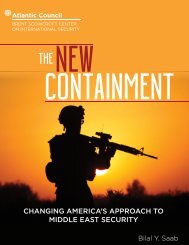POLITICS GOVERNANCE STATE-SOCIETY RELATIONS
Politics_Governance_and_State-Society_Relations_web_1121
Politics_Governance_and_State-Society_Relations_web_1121
Create successful ePaper yourself
Turn your PDF publications into a flip-book with our unique Google optimized e-Paper software.
<strong>POLITICS</strong>, <strong>GOVERNANCE</strong>, AND <strong>STATE</strong>-<strong>SOCIETY</strong> <strong>RELATIONS</strong><br />
CONCLUSION<br />
Addressing local and regional security threats, it is<br />
clear, requires work to repair the breach between<br />
states and societies in the region. This is no small<br />
task, but this paper has demonstrated that there<br />
are no shortcuts in this painstaking effort. Highlevel<br />
diplomatic bargaining without local conflict<br />
resolution will not extinguish the region’s civil<br />
wars. Military pushback without reliable and<br />
equitable local governance will not rid the region<br />
of the scourge of ISIS. Most notably, governance<br />
reforms that do not meaningfully reflect or create<br />
greater inclusion, transparency, effectiveness, and<br />
accountability will not win the allegiance of Arabs,<br />
particularly not young, skeptical populations living<br />
in a connected, complex world where non-state<br />
forces compete with states for allegiance. ISIS may<br />
be a dead end for the region’s<br />
citizens, suffering from violence<br />
and chaos—but it is equally true<br />
that renewed authoritarianism<br />
does not offer reliable security<br />
or stability for a region in crisis.<br />
This paper sketched an<br />
alternative pathway that can<br />
produce more stable and<br />
sustainable governance for<br />
the region. It laid out some priorities for how to<br />
move toward that goal. At the most fundamental<br />
level, functional states provide basic internal and<br />
external security, public services and goods such<br />
as education and physical infrastructure, and an<br />
expression of collective identity. But how states<br />
provide those things matters very much. By<br />
attending to the analysis and recommendations<br />
above, leaders and policy makers can begin to<br />
ameliorate the current fear and mistrust between<br />
citizens and states in the region, address basic<br />
needs, and enable consensual and effective<br />
decision-making about everything else. With these<br />
components in place, governments should be able<br />
to develop and maintain sufficient basis for their<br />
This is the real<br />
war against ISIS,<br />
and it is indeed<br />
generational.<br />
legitimate exercise of authority, and thus provide<br />
the basis for a sustainable political order.<br />
Stabilizing the Middle East is thus primarily an<br />
indigenous project. But it is also a project that<br />
affects the world as a whole, and is deeply in the<br />
United States’ interests—even more so now than<br />
when the United States first took on the mantle<br />
of regional leadership in 1956. Achieving that goal<br />
requires persistent, patient, long-term investment—<br />
not just military force to push back extremism,<br />
but work with local partners to replace extremist<br />
rule with law and order, reliable and equal justice,<br />
participation, and development. This is the real war<br />
against ISIS, and it is indeed generational. It is the<br />
fight facing that rising generation of young Arabs,<br />
who might raise the region up<br />
with their energy, or fall along<br />
with it if those energies are not<br />
harnessed in the right way. They<br />
deserve all the help they can get.<br />
Ultimately, building societies<br />
that are resilient in the face of<br />
sectarian conflict and terrorist<br />
violence requires more effective,<br />
responsive institutions that<br />
can win citizens’ trust and loyalty, and more fair<br />
and functional systems that can offer the region’s<br />
majority, its young people, meaningful opportunities<br />
to achieve their ambitions for themselves and their<br />
communities. The project must give young men and<br />
women reason to invest in their hopes for this world,<br />
instead of hastening their progress toward the next<br />
one. Sustainable governance in the Middle East is<br />
an imperative for the security of the region and the<br />
world—urgent, and worthy of thoughtful, persistent<br />
investment by regional and global leaders. There<br />
are no more alternatives to experiment with, and<br />
no more time to waste.<br />
ATLANTIC COUNCIL<br />
39



